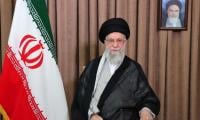Long live the constitution
The opposition should now focus on the economic mess that the country has been left with
Despite the terrible cards dealt to Pakistan’s democracy, most of Pakistan’s younger generations cannot recall the various times the country’s constitution has been callously disregarded in a quest for power. Perhaps that may explain the ambivalence regarding the April 3 actions by the PTI government and PM Imran Khan. For those that do remember our constitutional and judicial history, the night of Thursday, April 7 will no doubt become a symbol of the supremacy and sanctity of the constitution, protected by the judiciary in an historic verdict. After five agonizing days of hearings, the Supreme Court has ruled that the April 3 ruling by Deputy Speaker National Assembly Qasim Suri was “contrary to the constitution and the law and of no legal effect, and the same are hereby set aside”. With a unanimous 5-0 decision, the apex court has ordered that the National Assembly stands restored; and the next session will be held on April 9 during which the vote of no-confidence will be held. Per the court, Prime Minister Imran Khan could not have advised the president to dissolve the assembly and the NA was therefore “in existence at all times, and continues to remain and be so”.
Considering Pakistan’s judicial history, there had been more than a healthy level of scepticism about the eventual court ruling. For far too long has the ‘doctrine of necessity’ prevailed over the constitution and the law of the land. Last night’s course correction by the Supreme Court has hopefully finally laid to rest any debate about the doctrine of necessity, with the five-member bench clearly ruling that the constitution of Pakistan trumps all trump cards.
Opposition leaders have obviously welcomed the decision wholeheartedly. Prime Minister Imran Khan has called a cabinet and party meeting for today and is scheduled to address the nation tonight. With the patronage he once had now gone, and with deep dissent within his own party, he has lost strength already although there are many who still believe his narrative of conspiracy. There are speculations that the PTI may use the statement of the Election Commission of Pakistan (ECP) that elections cannot be held before October as an excuse and resign en masse when the Saturday session takes place. The vote of no-confidence, however, will still go ahead as has been said in the court’s short order. A new prime minister will be elected right away if it is successful. Importantly, the speaker cannot prorogue this session until a new PM is elected as per the short order.
The opposition should now focus on the economic mess that the country has been left with. The new government may not last long and go for fresh elections when the ECP gives a go-ahead. So far, the opposition has said that it will try to take the country to a stable economic direction. We hope that the opposition will not repeat the vindictiveness of the PTI regime but will instead focus not just on healing the economy but the nation as well, which stands bitterly polarized. As for the PTI, despite the party’s tendency to rely on narratives of disloyalty and patriotism, the best way forward would be a graceful exit and a preparation for peaceful elections that are devoid of dangerous accusations. After 75 years of independence, and a deeply troubled relationship with democracy, the country needs no more experiments. And its people deserve a country where the constitution reigns supreme. Regardless of who wins politically at the end, it is the long-awaited win for the constitution that we celebrate today.
-
 Kelly Osbourne's Mom Sharon Receives 'shut Up' Call Accepting An Award For Late Hubby?
Kelly Osbourne's Mom Sharon Receives 'shut Up' Call Accepting An Award For Late Hubby? -
 Claude Overtakes ChatGPT On Apple App Store After Pentagon Dispute
Claude Overtakes ChatGPT On Apple App Store After Pentagon Dispute -
 What Happened To Ayatollah Ali Khamenei's Family During US -Israel Attack On Iran
What Happened To Ayatollah Ali Khamenei's Family During US -Israel Attack On Iran -
 BRIT Awards 2026 Winners Revealed
BRIT Awards 2026 Winners Revealed -
 Shia LaBeouf Arrested Again In New Orleans On Additional Battery Charge
Shia LaBeouf Arrested Again In New Orleans On Additional Battery Charge -
 Shamed Andrew Upset With THIS Family Member Over Current Condition
Shamed Andrew Upset With THIS Family Member Over Current Condition -
 Michael Jackson Estate Sued With Allegations Of Years Of Abuse From Late Singer
Michael Jackson Estate Sued With Allegations Of Years Of Abuse From Late Singer -
 Meghan Markle Shows ‘real Pain’ With Her Body Language In Jordan
Meghan Markle Shows ‘real Pain’ With Her Body Language In Jordan -
 Jennifer Garner Names Her Movie That She Hasn't Seen In Full Since Its Premiere
Jennifer Garner Names Her Movie That She Hasn't Seen In Full Since Its Premiere -
 Bridgerton’s Michelle Mao On Facing Backlash As Season Four Antagonist
Bridgerton’s Michelle Mao On Facing Backlash As Season Four Antagonist -
 King Charles Gets New ‘secret Weapon’ After Andrew Messes Up
King Charles Gets New ‘secret Weapon’ After Andrew Messes Up -
 Shia LaBeouf Makes Bold Claim About Homosexuals In First Interview After Mardi Gras Arrest
Shia LaBeouf Makes Bold Claim About Homosexuals In First Interview After Mardi Gras Arrest -
 Princess Beatrice, Eugenie ‘strained’ As They Are ‘not Turning Back’ On Andrew
Princess Beatrice, Eugenie ‘strained’ As They Are ‘not Turning Back’ On Andrew -
 Benny Blanco Addresses ‘dirty Feet’ Backlash After Podcast Moment Sparks Online Frenzy
Benny Blanco Addresses ‘dirty Feet’ Backlash After Podcast Moment Sparks Online Frenzy -
 Sarah Ferguson Unusual Trait That Confused Royal Expert
Sarah Ferguson Unusual Trait That Confused Royal Expert -
 Prince William, Kate Middleton Left Sarah Ferguson Feeling 'worthless'
Prince William, Kate Middleton Left Sarah Ferguson Feeling 'worthless'



